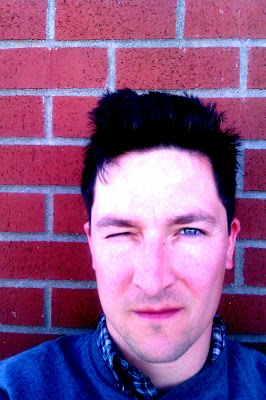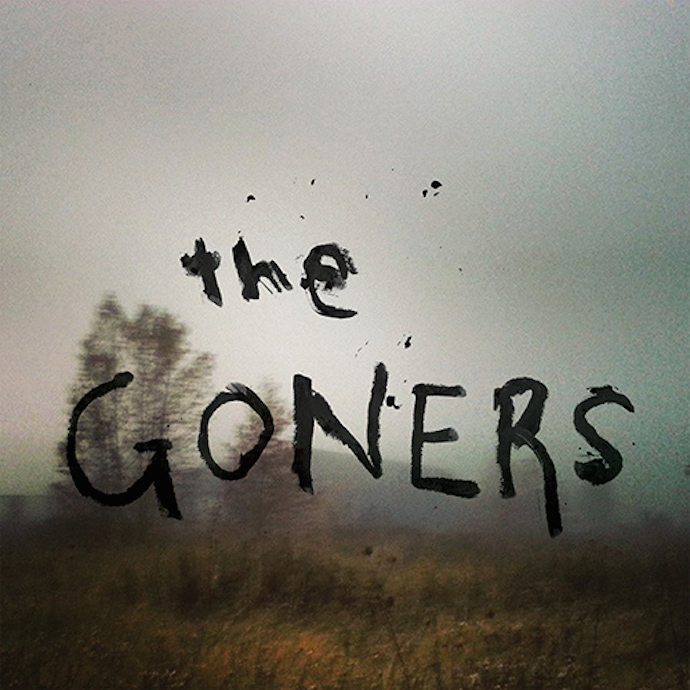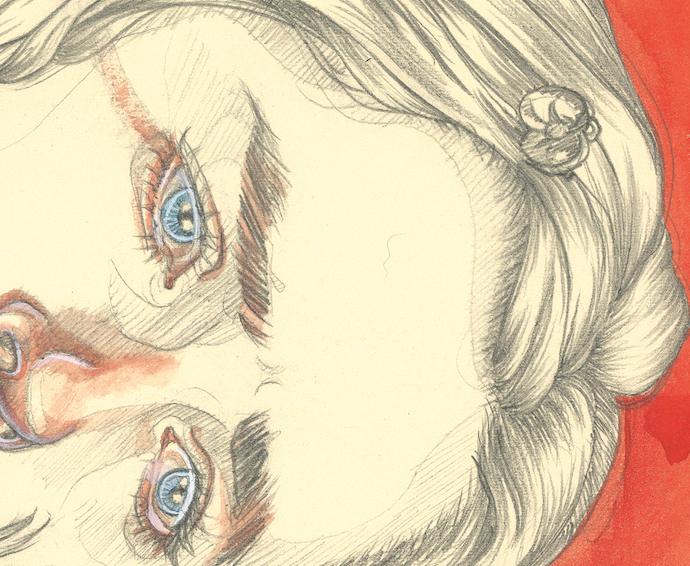DEATH, LOSS, AND THE ULTIMATE TRUTH OF THE WEATHER: AN INTERVIEW WITH MARK GLUTH
25.05.15
 There’s a richness to the prose that Mark Gluth creates, that makes me reread lines and paragraphs over and over again. The sentences are so pristine it’s easy to get lost in even the shortest of them, clipped and threaded together like gossamer. He melds these formal virtuosities with heavy moods that engulf the reader in swarms of emotion, quite often involving death, loss, friendships.
There’s a richness to the prose that Mark Gluth creates, that makes me reread lines and paragraphs over and over again. The sentences are so pristine it’s easy to get lost in even the shortest of them, clipped and threaded together like gossamer. He melds these formal virtuosities with heavy moods that engulf the reader in swarms of emotion, quite often involving death, loss, friendships.
His latest book, The Goners, is a set of melancholic stories, beautifully realized and affecting. It follows on from his second novel, No Other, which was released last year.
[An excerpt from No Other appeared on Fanzine last week.]
FZ: How long did it take to write The Goners? Was it very different than No Other? I know that with your first novel you worked on it for a few years.
MG: Well, The Goners took about 9 months to write, which is really fast for me, but writing a collection of stories was different than writing a novel in that, no matter how tied together the stories are, I don’t need to work towards the kind of cohesiveness I would look for in a novel. Plus it’s not even 100 pages long. No Other took close to 6 years. When I write a book, I usually have a plan for the types of things I want to do with the book, and what I see the end result looking like. Early on there’s usually plenty of disparate elements, and as I work on the book I guess my vision narrows and some stuff falls by the wayside. With No Other, yes, the end result is both really true to my initial intention, but also radically different. I don’t really edit my finished manuscripts; or rather I constantly edit them, depending on how you look at it. Basically I start at the beginning and work forward from there, but every time I do any writing, I start at the beginning and edit everything leading up to the point where I’m doing new writing. So by the time I finish writing the last sentence I’m basically done with the book.
In terms of knowing where you wanted No Other to go–did you have any specific rules that you had made for yourself during the writing process? There were these rhythms that I kept noticing – like internal thematic rhymes or something, a lot of the time with references to death, when certain people died, also themes to do with light, things being obscured, people being temporarily blinded. Were any of these something you’d set out or structured beforehand?
Mostly, like 99% of the time, that stuff totally intuitive, or accidental even; something where I just notice it after a certain point and either choose to accept it or do something differently. Essentially what ends up in the book is the best that I feel I am capable of producing regarding what it is I was trying to do, which is sometimes planned out, sometimes defined, but usually just haphazard and intuitive. Sometimes I just aim at abstract stuff, trying to replicate the feelings I have when I daydream about specific scenarios and stuff. Often times, what makes it into the final draft is what triggers me to kind of daydream the film in my head that the book is.

How do you map things out? Do you make scrapbooks, notes, collect images?
I keep notebooks where I write ideas for story structures, sometimes visual representations of the narrative shape, ideas for story lines, quotes. Once I start writing, I do my writing in these notebooks as well and so the different content gets intermingled. I type up the actual writing, and then edit that on the page, type that up again print it out, etc. So my mapping can be found in all the random notes and stuff. A lot of my notes are actually just a bare bones description of a narrative thread, to kind of test the cause and effect beneath the surface, like ‘character 1 did this thing, which caused character 2 and 3 to do these two things, which caused character 1 to do these 2 things.’ I do that stuff just to make sure it makes sense, or in the case of No Other that it doesn’t make sense in a very specific way.
How important is the visual element of your writing?
In No Other one of my initial intentions was for there to be long blocks of text, big monolithic paragraphs. That’s why I didn’t break dialogue out of the paragraphs and just italicized it, which kinda sucked when it came to copy editing the thing. When I’m writing, I can only type my stuff up in Times New Roman font. It looks weird in any other font for some reason. My regular handwriting is for shit though. Sometimes I write in cursive to make sure I can do it, but it ends up being hard to read back.

There’s this huge, thick, sadness that flows through your work–especially in No Other. The guilt and strains within the relationships of the characters is rendered acutely. Do you feel pain while you are writing? Does writing help in any way?
You know, it’s complicated. When I write about pain, it’s rarely head on, and it’s rarely based on stuff I’ve directly experienced. A lot of times I start with seeing a character or set of character in a specific place or set of circumstances, and usually those are painful circumstances. I then try to figure out how they got there. Like, in No Other, I pictured a young woman having an argument with her girlfriend, and I sensed one of them was drunk, and there was violence. So I had tried to figure out how they got there, and because it was a painful situation I think pain lead to it and came out of it you know? But then there are instances where I kind of try to pay homage to actual pain I’ve felt, but then I try to tuck it in or something. In The Goners, a central inspiration was when my friend Darren died a couple months after we graduated from High School, suddenly. I circle that in different ways throughout the book. Or in No Other when Henry, the dog, dies, I based his symptoms off of when our dog Clarence died. So when I’m writing about pain that came from actual events I experienced, I feel like I’m paying homage to the people that were involved in that real event. Celebrating it perhaps.
The weather seems to be a reoccurring theme in your work. The rain and fog and mist feel as much of a character as the people in The Goners, as well as in your other work. It also plays off beautifully against some of the sparse and precise blocks of text, filling out what the words seem to deny. It creates this really strong friction and tenseness.
I kind of imagine the weather happening on some deeper level than what happens to the characters in my stuff, as if the weather was some sort of ultimate truth that bubbles up occasionally, and the tribulations of the characters is inconsequential. So in that way it’s a ‘character’ in the same sense that the style of the language is, and the structure of the narrative is. And I guess, as I answer this, I’m talking about internal atmosphere in rooms and buildings as much as external stuff. Anyway, as I’m writing a scene or whatever, it usually comes into clearer focus as I rewrite it, and the weather is something that, once it has come into focus for me, really defines the scene for me–to the point that I’ll alter all kinds of stuff in the narrative to accommodate a cloud or something that I imagined.
For example: in The Goners, there’s this scene where these girls are sitting in a bus shelter and somewhere along the line I pictured it raining. From that point forward, the whole story’s weather was built around the rain at the bus shelter being legitimate. Previously it had taken place in a more summer like season. In the end it’s really instinctual a lot of the time. I know that I’m done with something when I can read it and the images it triggers in my mind match with what I kind of imagined or aimed for. And that matching usually comes down to nailing the atmosphere and mood, which usually means the weather and light and stuff.
I love that description of “ultimate truth”. It makes me think of how things can make emotional sense as opposed to labouring over traditional narratives. Can you talk about where The Goners came from?
Well, The Goners came from a lot of different things. My father, Edward, died very suddenly right as I was finishing No Other. With No Other finished, I was expecting to take some time before starting something, but instead I felt really restless, and felt like jumping into something new. I’m sure this was tied into my dad dying but it’s hard to recall what was specifically running through my head. Anyway, it all kind of coalesced when I saw this play that a bunch of high school students put on. It was a production of Spring Awakening, and the kids pretty much ran the whole production and did it sans involvement from any sanctioned school program or whatever. So it was a bunch of 15-17 year olds just making art that they wanted to, in a super accomplished way. It had this really great energy, and it totally bowled me over. Anyway, I came out of the show with a pretty clear idea of what I wanted to do with The Goners.
I was in awe when I saw William Basinski‘s name in the blurbs for No Other. Was it your idea to pass the book his way? Could you talk about the musical influences on both your recent books? Do you pinpoint specific artist or pieces of music to study and take apart as research or is it more of an organic thing that just falls into place when you’re writing?
Yeah, as Ken and I talked through blurbs and stuff for No Other, I threw out Basinski as a pie in the sky dream. So Ken reached out to him and he was kind of enough to do it. But yeah, one of the nascent, early-on influences for No Other was black metal. I kind of imagined No Other occurring with Prison Of Mirrors by Xasthur playing in the background. I just wanted to write a book about despondency, and to me there’s no better portrayal of despondency than black metal.
As far as influences, it’s an organic thing. I just find stuff that I find compelling and fixate on it or whatever. Ambient music in general has been a consistent influence on my stuff for years and years. With The Goners, I was also interested in writing something that worked like a pop song. My first two books worked, in some ways, from the accumulation of content throughout the books, a sustaining of effects, almost like chords or harmonies forming. With The Goners, I tried to imagine the pieces as little three-minute pop songs or something. I got into how to make them seem more surface-y. I liked the idea that each sentence would disappear once you read it.
Another theme that comes out of your stuff is relationships – often flawed and faltering and deep at once. The family dysfunction in No Other, and the way the kids interact and relate to each other in The Goners. I know that you’ve talked about how although you want the relationships to be emotionally authentic, you don’t feel emotionally attached to your characters, as they are devices within the writing. I suppose I’m asking if you see yourself writing from an emotional place? Does it vary with each book? With the sad and sudden passing of your father, it seems like maybe The Goners came from a need to write perhaps, which I can relate to I think.
I’d have to say that my primary way of interacting with the world is through my emotions, so I’m sure I write from an emotional place. Yeah I don’t feel attached to my characters, but when I’m writing I try to have what I consider radical empathy for them, meaning I try to see the world of the book through the characters eyes as much as possible. So often times I’m trying to study a characters emotions to such a point that I get subsumed by it, and to a certain extent that the book itself gets subsumed by it at that point. With my Dad, his dying was just too big and multifaceted for me to really think about or absorb or process, so I think I was sort of left effected by the shadows of this super large thing (his death) that I couldn’t really see. I tried to capture that in some way with The Goners. Having said that I’m a pretty positive person, and I wasn’t trying to write a sad book or anything. I think I was trying to write a book about it being OK in some weird way, if that makes sense.